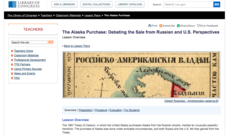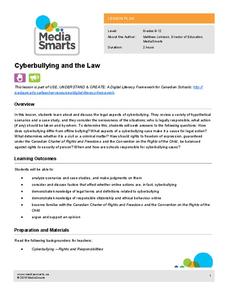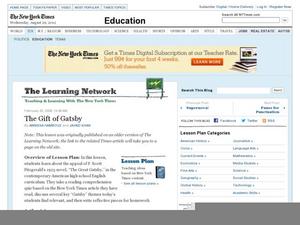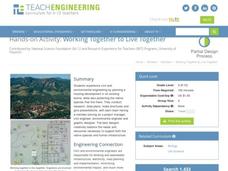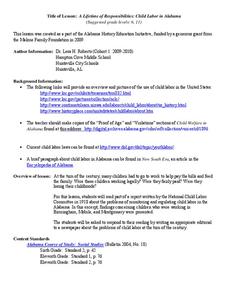Alabama Learning Exchange
Imaginary Numbers? What Do You Mean Imaginary?
Don't worry, this resource actually exists. Scholars learn about imaginary numbers and work on problems simplifying square roots of negative numbers. As an extension, they research the history of imaginary numbers.
Rainforest Alliance
Colombia Biodiversity
How diverse is the rainforest? How much more diverse is a rain forest than a temperate forest? Explore these focus questions in a lesson that explores the plants, animals, and insects in forests. After listening to a reading about...
J. Paul Getty Trust
Shaping Ideas: Symbolism in Sculpture—Lesson 2
Young artists create a series of sketches of ideas for a sculpture, and using the criteria develop in the previous class, critique their sketches. They then choose one of their ideas and create their work of art.
Library of Congress
The Alaska Purchase: Debating the Sale from Russian and U.S. Perspectives
Seward's Folly or brilliant strategic move? Class members investigate primary source documents from each country to determine the rationales behind the sale and purchase of Alaska, and then stage a debate.
School District of Palm Beach County
Egyptian Hieroglyphs
Humans have been developing number systems for thousands of years, and while they can be very different from one another, they can also share surprising similarities. Take your young mathematicians on a journey through the history of...
Media Smarts
Bias
See how bias operates firsthand. Half of the class reads one article while the other half reads another article on the same event. The obvious differences emerge when the two sides talk about their observations though. Several handouts...
Media Smarts
Cyberbullying and the Law
Research, role-playing, and reflection are the three “R’s” that form the basis of an examination of Cyberbullying. Although based on the Criminal Code of Canada, the included scenarios and case studies provide valuable resources for a...
Media Smarts
Challenging Hate Online
Looking at the different ways organizations disseminate their messages using digital media leads to developing a digital anti-hate media campaign. Although some of the resources reflect the Canadian developer, the links provide...
Media Smarts
The Citizen Reporter
Ripped from the headlines! Discuss topical social issues like racism, discrimination, and diversity while exploring the concept of citizen journalism. Begin with a professional-looking presentation on the history of citizen journalism....
Media Smarts
The Broadcast Project
As part of a unit on media studies, kids are asked to chart their viewing habits, observe the advertising that sponsors their favorite shows, and then to imagine what they would broadcast if given a block of airtime.
Curated OER
The Gift of Gatsby
A reading of “Gatsby’s Green Light Beckons a New Set of Strivers,” a New York Times article by Sara Rimer, triggers a discussion of the American Dream and what it means to strive for something. Following the discussion, class members...
Curated OER
Not Getting the News about the Stamp Act
How did American colonists react to the Stamp Act of 1765? Your young historians will examine primary source material by reading excerpts from a transcription of the Pennsylvania Gazette and then identifying the sentiments expressed by...
9/11 Memorial & Museum
The Destruction and Rebuilding of the World Trade Center
How did an investigation into the causes of the collapse of the Twin Towers, as a result of the 9/11 attacks, inform the construction of the new 1 World Trade Center? That is the central question of a resource that asks class members...
Curated OER
During Reading Strategy for Charles Dickens’ Great Expectations
Readers create a literary scrapbook for one of the characters in Charles Dickens' Great Expectations and fill it with mementoes, journal entries, letters, etc. A great way to get kids to think about characterization.
Teach Engineering
Working Together to Live Together
Whose home is it anyway? Design teams plan a housing development in which they must also protect a native species. The teams consist of a project manager, civil engineer, environmental engineer, and graphic designer. Teams present their...
University of Wisconsin
Getting the Word Out
An appropriate way to celebrate and conclude the construction of a rain garden is to share it with the community. Small groups collaborate to design an outreach product such as a PowerPoint presentation, brochure, or poster, to draw...
National Endowment for the Humanities
Lu Shih — The Couplets of T’ang
Writing poetry in ancient China was the modern equivalent of sending a greeting card. Scholars learn about the ancient Chinese poetic form called the lu shih. They read about the context of poetry during the T'ang Dynasty and complete a...
Alabama Department of Archives and History
A Lifetime of Responsibilities: Child Labor in Alabama
Imagine children working long hours in factories, coal mines, and in the fields. Class members examine a series of pictures and read about early attempts to regulate child labor and current child labor laws.
Alabama Department of Archives and History
A Worse Death: War or Flu?
In a instructional activity that integrates history and mathematics, class members create graphs that compare military death statistics from World War I with those that resulted from the influenza pandemic of 1918.
Alabama Department of Archives and History
Alabama and the Treaty of Versailles
As part of a study of the treaty that ended World War I and the seeds of resentment it planted, class groups compare President Wilson's Fourteen Points and the articles of the Treaty of Versailles.
Alabama Department of Archives and History
Alabama's Steps to Statehood
To demonstrate their understanding of the steps Alabama took to become a state, groups create a poster that identifies what the United States Constitution and the Northwest Ordinance required of a territory to become a state.
Alabama Department of Archives and History
Alabama BEFORE the American Revolution
Did you know that prior to the American Revolution, Alabama was a part of the British empire and called New West Florida? Class members research the economic, political, and social realities of this territory and compare them to those of...
Alabama Department of Archives and History
Alabama's New South Era
The industrialization and urbanization of Alabama during the New South era (1865-1914) is the focus of a lesson that asks class members to use primary source documents to examine the impact of industrialization on Alabama workers and...
Alabama Department of Archives and History
Alabama Farm Life in the Great Depression
The Great Depression not only impacted city folk and factory workers, it also had a profound effect on farmers. Young historians examine primary source materials that document the struggles of Alabama farmers during this time and then...
Other popular searches
- Assessment Rubrics
- Rubrics for Reading Skills
- Writing Rubrics
- Drama Rubrics
- Persuasive Writing Rubrics
- Bio Poems Rubrics
- Expository Writing Rubrics
- Creating Rubrics
- Rubrics Literature Circles
- Grading Rubrics
- Rubrics for Ceramics
- Concept Map Rubrics





